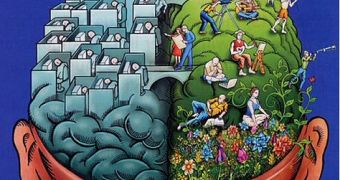A new study carried out by researchers at the University of Zurich, studied the brain responses of soccer fans to pain suffered by individuals from their own group as well as from another team, and found out that neural responses indicate whether or not we will help a person in need, and also why are we most willing to help members of our own group.
When we see someone from our own group or an outsider suffer, our brain causes neural responses in two completely different areas, and depending on the activated zone, we will help that person or not.
Neuroscientist Grit Hein, Tania Singer, director at the Max Planck Institute for Human Cognitive and Brain Sciences, and social psychologist C. Daniel Batson, from the University of Kansas, USA, carried out an experiment analyzing the neural responses of soccer fans.
In the name of science, test subjects watched either a member of their own group (ingroup) or an individual from a rival team (outgroup) receive painful shocks through electrodes attached to the back of their hands.
The subjects had to choose between wanting to help the ingroup or outgroup member by receiving some of the pain, simply watch as the person received the shocks or distract themselves by watching a soccer game video.
The researchers chose this method because in this case, helping had a very serious cost linked to physical pain.
The results of this experiment showed that if the person in pain belonged to an ingroup, then the brain areas that would activate were those linked to empathy for others, and the higher the activation, the more willingly to help became the subject.
On the other hand, if test subjects saw a member of an outgroup in pain, the brain regions motivated by reward became active.
In other words, the more the 'rival' suffered, the more the reward-related activation of the brain increased, and the less the subject was willing to help.
Before this rather harsh experiment, some scientists wandered how people can watch others suffer on television and not be affected at all, but still be able to sacrifice for some people without wanting anything in return.
The results of this research show that it's all a matter of belonging to a group.
Grit Hein received the Branco-Weiss Fellowship from the Society in Science (Zurich) for this study and other work.
The results were published in the scientific journal Neuron.

 14 DAY TRIAL //
14 DAY TRIAL //